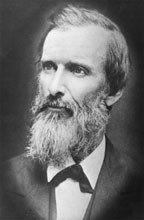News & Events
Westminster College and the Civil War
Posted on Thursday, January 24, 2002
Westminster did not lose many students to voluntary enlistment or to the later-imposed draft. Some graduates entered the Army after graduation but few before completion of their studies.For he today that sheds his blood for me
Shakespeare, Henry V
The Tavern which still functions as a local dining establishment and landmark.
It is an important aspect of the intricacy of American social and political history that, as opposed to slavery as were many northern religious and secular sectors, abolition of slavery was not a declared purpose of the Union (that is, the Federal or Northern) war effort early in the war.
The first year and one-half of the war did not go well for the North. In a sense, because of its far greater material, technological, demographic and financial resources, it proceeded in a more measured, almost casual, way to accomplish its objectives. By way of contrast, the South was facing potential and swift destruction in that its rural, aristocratic, plantation and slavery-based society was threatened with imminent eradication if secession could not be made permanent. Reunification on any basis would bring inevitable domination by ever more powerful urban, industrial North. Resistance to slavery by its opponents would prevail as modernization in western civilization together with the rising tide of commitment to democracy both in Europe and in the United States made slavery an anachronism. The southern way of life controlled by the wealthy white aristocracy would not long survive unless entirely sovereign. Thus the southern war effort was undertaken with greater earnestness and, initially, far greater success.
Both the Lincoln administration and informed sources generally believed that only from a position of strength; that is, only after a Union victory over Confederate forces in a major engagement, thereby demonstrating a realistic prospect of ultimate Union success in the war, would a declaration of emancipation seem to have the prospect of definitive enforcement across a reunified nation.
The victory at Antietam had another result beneficial to the North. It caused the Confederacy to abate temporarily its effort to carry the war north into Pennsylvania and Ohio and away from Virginia and the Kentucky-Tennessee theater of operations.
Primary Union armies of the East were then occupied with Lee's main army and unavailable to contain Confederate cavalry probes. In response to the threat to
Representative of these efforts was formation in September 1862, of the Westminster Guards, a reserve company of approximately 100 male students -- similar in number to a regular Army company. Commanded by Professor George C. Vincent, one of the founders of the College, they were rushed south on September 15, traveling by foot, wagon, canal, river and railroad to assist in guarding river crossings into Pennsylvania. They assumed their positions on September 17 as the Battle of Antietam raged a short distance away in Maryland.
Had the South been victorious at Antietam, Lee would soon have tried to continue north with the bulk of his army both to divert combat from his beloved Virginia and to replenish the strength of his troops among the lush, crop-laden farms of Pennsylvania at harvest season. The resistance of the Westminster Guards as well as of numerous other hastily-formed militia units would have proved crucial. We can only speculate upon what would have resulted.
It was the immediate prospect of a large repository of shoes at Gettysburg which caused the ill-clad Confederates to move in that direction and inadvertently brought about the single most famous battle of the war and the one that is regarded as marking the moment at which, together with the simultaneous fall of Vicksburg in Mississippi, the tide of war decidedly shifted in favor of the Union.
Morgan raided extensively before being intercepted and defeated by now highly effective Union cavalry. Morgan and some of his troopers were captured although he later escaped from prison. Lee having been defeated at Gettysburg to the east, the Confederate cavalry who eluded capture also retreated.
The practice also explains why when, during battles where entire units were virtually destroyed, the result was the sudden loss of nearly every young man of a particular neighborhood or town.
The war had brought about an unanticipated opportunity for demonstration of fraternity and patriotism.


More Stories



